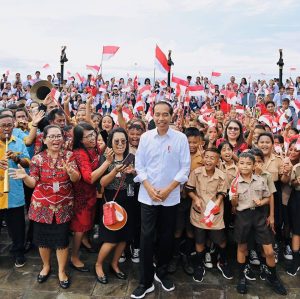Ever since the advent of the Suharto regime in the mid-1960s, corruption has been a major problem for Indonesia – and it is unlikely to get better any time soon.
After the resignation of Suharto and the collapse of his New Order regime during the Asian Financial Crisis in 1998, we believed that a democratic and less corrupt Indonesia was on the horizon. Restrictions on mass media were removed, democratic reforms were put in place, and with greater transparency in the body politic and the creation of the Corruption Eradication Commission, or KPK, there were ostensibly good reasons to believe that the demons of the Suharto era has been exorcised for good.
Starting with the Abdurrahman Wahid administration in 1999, which I served under as an economics minister, and then during Megawati Sukarnoputri’s term in office ending in 2004, it seemed the optimists would be proven right. According to Transparency International, a global civil society organization, Indonesia experienced a dramatic decrease in corruption during these years.
Yet the situation suddenly took a turn for the worse in 2004 with the presidency of Susilo Bambang Yudhoyono. According to Transparency International, by the end of Yudhoyono’s first term in office in 2009, the level of corruption in Indonesia had not been reduced significantly. However, many Indonesians believed Yudhoyono was a clean figure, and hence better than Suharto. Although five of Yudhoyono’s ministers and top-ranking officials in his administration were sentenced to jail on corruption-related charges, public opinion about Yudhoyono and the KPK remained high since it was believed that they were doing the right thing.
When Joko Widodo won the 2014 election there were again reasons for optimism. A non-elitist politician with a clean track record, Widodo’s humble and easy-going manners suggested a break from the past. Having also joined his cabinet as a coordinating minister during his first term in office, I saw up close what I believed up to be an honest and sincere man who wanted the best for his nation.
Unfortunately, I was proven wrong. Many of the men and women within Widodo’s inner circle and his coalition partners proved to be terribly corrupt, with a massive conflict of interests, resulting in poor and corrupted governance. Instead of displaying leadership, Widodo failed to use an iron fist to deal with wayward politicians when it was most needed and as a result corruption quickly spiraled out of control. To wit, the most recent report from Transparency International shows that corruption is now at its highest level in more than two decades.
Such a sobering reality, of a president unwilling to use his powers to fight corruption, reminds me somewhat of the Suharto years. Suharto himself was not extraordinarily corrupt and reportedly lived a modest lifestyle. Yet he gave free rein to his family members, party leaders, cabinet members, and the business elite to enrich themselves and amass vast fortunes. By doing this Suharto essentially developed a loyal base that enabled him to stay firmly in power.
Instead of wielding power to build an even better Indonesia, Suharto used patronage politics to satisfy his lust for power. Widodo is guilty of the same, only in this situation, it is even more inexcusable because it didn’t have to be this way.
The KPK, which was initiated in the last year of the Wahid government in 2001 and formed in late 2002, was doing a reasonably good job at fighting corruption and had some notable successes in prosecuting high-profile cases involving powerful politicians. Then, in 2013, the National House of Representatives (DPR) started deliberations on a bill which, if it passed, would effectively weaken the KPK. Unfortunately, neither Widodo nor his men tried to consult or lobby the DPR to cancel it. As expected, when the bill was finally passed into law, Indonesians were visibly upset, and large street demonstrations erupted. Widodo remained silent.
But these are not the only faults of Widodo. Unlike his predecessors, Widodo has failed to act as a guardian of Indonesia’s democracy. According to the Democracy Index, a highly respected annual survey conducted by the Economist Intelligence Unit, from the beginning of the Widodo presidency Indonesia has been ranked as one of the world’s worst performers in terms of democratic backsliding. Indeed, the survey captures the realities Indonesians have faced over recent years: democratic norms and institutions have been undermined, the media has been bullied into remaining uncritical of the government, and the government has weaponized harsh laws on defamation and blasphemy to silence its critics.
Widodo’s story is rich with irony: he become president because Indonesia had turned democratic, but when he was in power, he started a systematic effort to weaken democratic institutions and practices.
In the final analysis, the Widodo administration has single-handedly turned back the clock on Indonesian politics by 25 years. Even more damning is the fact that, unlike Suharto, his time in office has seen the emergence of dynastic politics. Widodo’s two sons, Gibran and Kaesang, and even his son-in-law Bobby Nasution, have big political ambitions. Gibran is now the mayor of Surakarta, Kaesang has announced his intention to run for political office, and Bobby is the mayor of Medan. It is known that they harbor ambitions for running for even more powerful positions in the future, all of which suggest the Widodo family is looking to build a family empire.
During last year’s G-20 summit on the island of Bali, Widodo took advantage of his being the host by taking front stage and trumpeting Indonesia’s achievements as a democracy. Nothing could be farther from the truth. While Indonesia is indeed an electoral democracy, it is now semi-authoritarian in practice. Such is Widodo’s legacy.

































